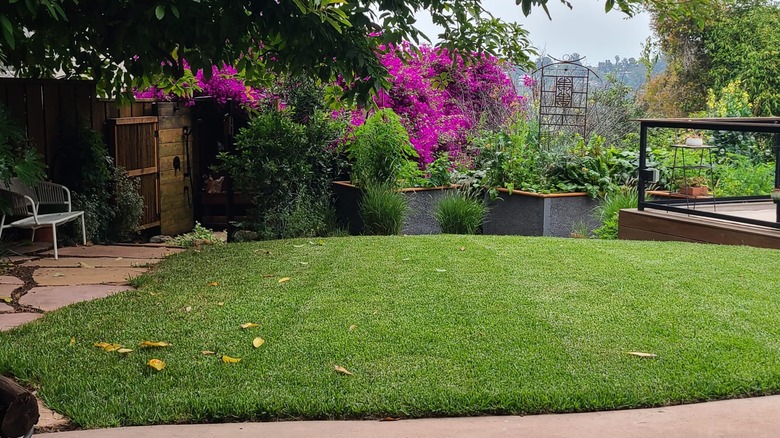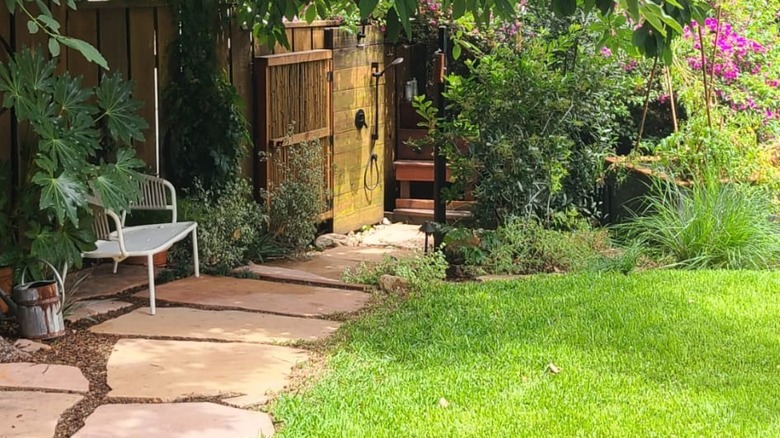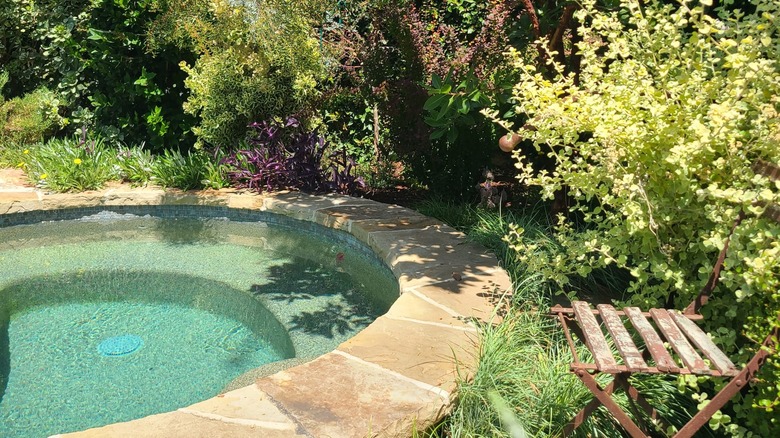What Is The Best Weed Killer For Flower Beds? We Asked Our Landscape Expert
Mulching flower beds, planting perennials, and adding decorative curiosities is a therapeutic activity many look forward to. Unfortunately, maintaining clean and organized flower beds is challenging if weeds aren't controlled. Sometimes, we can pull out these scraggly-looking plants and carry on, but it often requires intervention from weed killers to get the job done. In an exclusive interview with House Digest, Roy Altaras, Landscape Designer and Horticulturist with Landscape Design & Build explained what the best weed killer on the market truly is. "The first one that comes to mind is the brand Roundup when considering reliable herbicide," he said. "This brand has been around for many years and is used excessively among gardeners, farmers, and homeowners."
"Its main active ingredient, glyphosate, has been speculated as a dangerous chemical to pets and humans when exposed largely and is of risk to give cancer," Altaras warned. "The most important point is to strictly follow the label instructions when diluting it and to use it responsibly." Glyphosate is one of the most commonly used herbicides in the U.S., it prevents plants from making the necessary proteins to grow. Avoiding exposure to glyphosate can be as simple as wearing gloves, eye protection, and a mask to minimize skin contact and inhalation. But, Altaras recommends an alternative route if possible, saying, "a better option for homeowners of residential gardens is to use only natural based products that are planet friendly. Read the ingredients on the label, or better yet, make it [yourself]."
Natural-based weed killer
Although glyphosate continues to be studied for its possibly harmful effects on health, Roy Altaras, in an exclusive interview with House Digest, shares that "it is a product that's been around for a long time and has been used by many homeowners and professionals around the world," but that you should exercise caution. "Use it only if you must and read the instructions on the label. It is best to let a pro apply it for you or, better yet, avoid using it at all." Instead, Altaras recommends natural-based products to protect ourselves, children, pets, and the environment. "Vinegar in a spray bottle is known to do the job. It can be mixed with (eco-based) dish soap to bond better to the foliage of the weed."
Mixing a gallon of vinegar with one cup of salt and one tablespoon of dish soap creates a home remedy for weeds at a fraction of the cost. The salt and acetic acid in the vinegar absorb the moisture weeds need, and the soap acts as a surfactant. You may need a few applications, though, as this won't infiltrate the root system. Another rapid solution if time is of the essence is boiling water, but it's imperative that the administration is controlled so as not to harm neighboring plants. "Weed killers are a whole industry; new brands and products constantly pop up on the shelves," Altaras said. "Do your research... always [look] for natural-based products."
Weed prevention methods
Part of eliminating weeds is preventing their return or stopping them from ever growing in the first place. Speaking exclusively with House Digest, Roy Altaras gave great pointers on prevention methods. "It is a proven fact that plants and groundcovers are known to suppress weeds almost completely. A good site preparation prior to any planting is key," he said. "Weeds usually grow in abandoned, untended areas, and they do not like good soils. Build your soil and amend it."
Additionally, he noted the benefit of utilizing eco-friendly mulch. "A generous layer spread between the plants will block light, and the weeds won't grow," Altaras explained. "A landscape fabric is not needed under a layer of mulch to allow it to decompose and provide nutrients to the soil. By following these simple methods, weeds will come only here and there, allowing anyone to pull them out easily." An advocate for always using eco-friendly methods to de-weed, he advises homeowners, "Unless we're talking about large scale gardens, or commercial areas that need to be prepped for planting and manual labor is not an option, I recommend refraining [from using] any herbicide as much as possible. For the general health of our planet, it would be best to [avoid] using chemical-based weed killers at any scale."


